The Musk Masquerade: Inside the AI Scam Bleeding Americans Dry, Stealing Billions
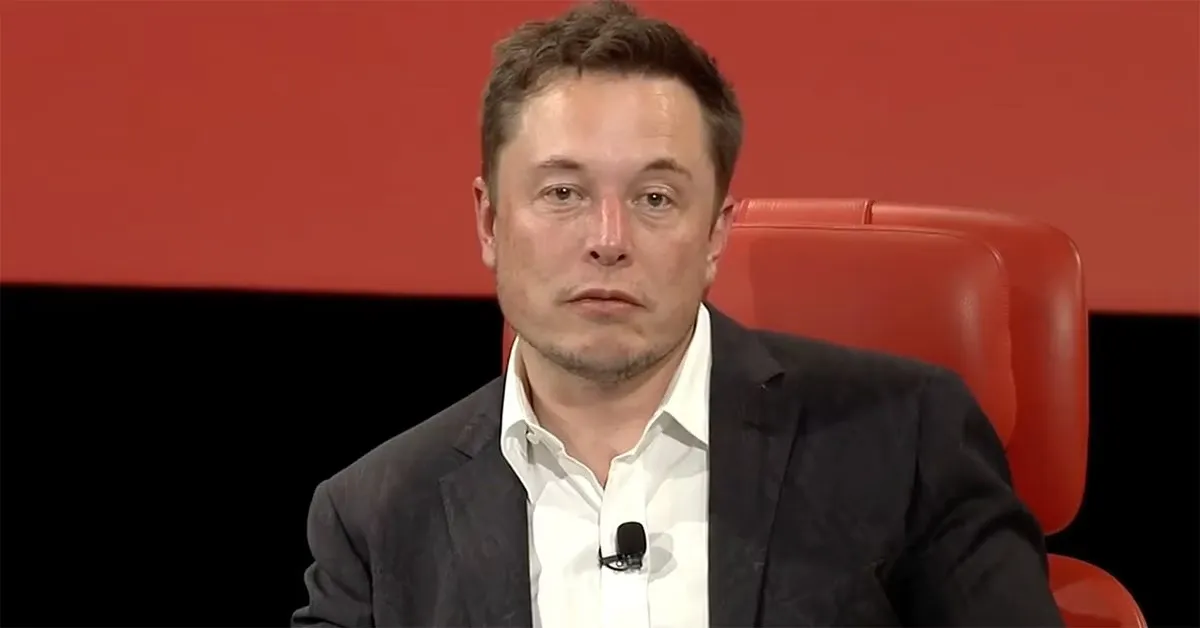
America’s trust in its tech titans is under siege, and the silence is deafening.
Scammers, armed with AI wizardry, are hijacking the likeness of Elon Musk — worth a staggering $500 billion — to fleece ordinary folks out of millions.
These aren’t your grandpa’s con artists; they wield deepfakes and voice simulators, crafting lies so convincing they’ve drained billions from unsuspecting victims.
Worse, this digital pillage thrives on Musk’s own platform, X, where fraudsters operate with impunity, peddling fake Tesla investments and cryptocurrency dreams.
No arrests. No accountability. Just shattered lives and a billionaire’s inexplicable silence.
Consumer Diligence rips the veil off this high-tech heist, exposing a scandal that demands answers.
The Musk Masquerade: A High-Tech Heist
Heidi Swan, a 62-year-old Texas healthcare worker, believed she was investing with a legend. She saw ads on Facebook and TikTok featuring Elon Musk, or so it seemed, promising hefty returns on cryptocurrency.
The videos were uncanny — his face, his voice, his charisma.
Swan invested $10,000, only to learn she’d been conned by a deepfake.
“It still looks like him, sounds like him,” she told CBS News, her trust shattered.
This scam, powered by artificial intelligence, exploits Musk’s fame to devastating effect.
Scammers use deepfake videos, voice-changing simulators, and AI-crafted messages to mimic Musk, luring victims with promises of Tesla stock profits or crypto windfalls.
Deloitte reports AI-driven fraud cost Americans $12 billion last year, with losses projected to hit $40 billion by 2027.
The Federal Trade Commission and Better Business Bureau warn of a surge in these scams, with Sensity noting Musk as the top celebrity target due to his wealth and vast online presence.
Scammers operate with chilling precision. They initiate contact on platforms like X or Facebook, often through friend requests or ads featuring Musk’s likeness.
Victims are nudged to private apps like WhatsApp, Signal or Telegram, where oversight is scant.
There, fraudsters deploy tactics like fake Tesla giveaways, crypto “doubling” schemes, or even romance scams, demanding untraceable payments via gift cards or cryptocurrency.
Urgency is their weapon, pressuring victims to act fast, often bypassing skepticism.
Once funds are sent, they vanish, leaving victims with no recourse.
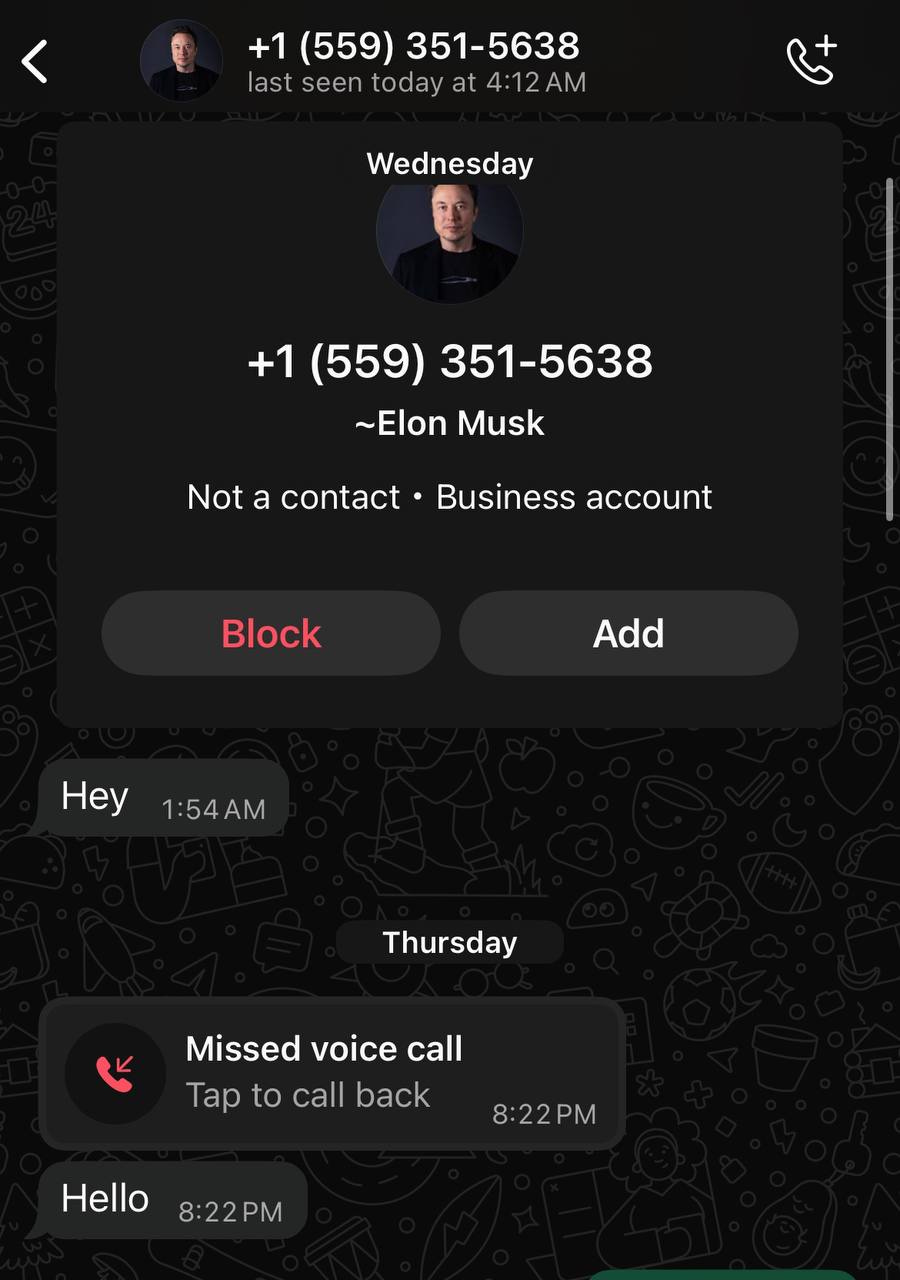
About a year ago, this analyst encountered this scam while investigating January 6 political prisoners, exposing FBI and Justice Department malfeasance.
Amid online attacks for this work, an X account claiming to be Musk approached, offering “life-changing capital” through Tesla investments.
Suspecting a scam, I engaged to expose it, challenging the impostor to deactivate my X account to prove authenticity.
Shockingly, my account was hijacked — morphed into an Elon Musk account — and permanently suspended.


Despite repeatedly and persistently blocking accounts from this scammer, the individual emphatically continues trying to convince me that he is, indeed, Elon Musk, continuously messaging me across platforms for a year, reappearing from new numbers daily or weekly despite blocks.
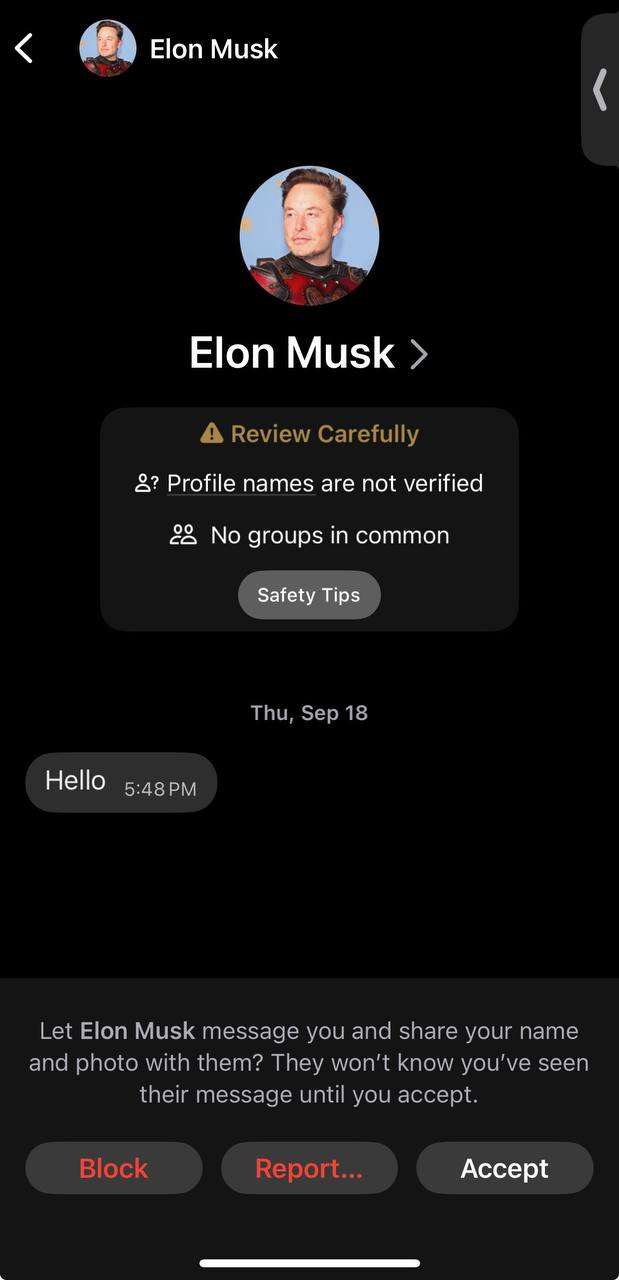


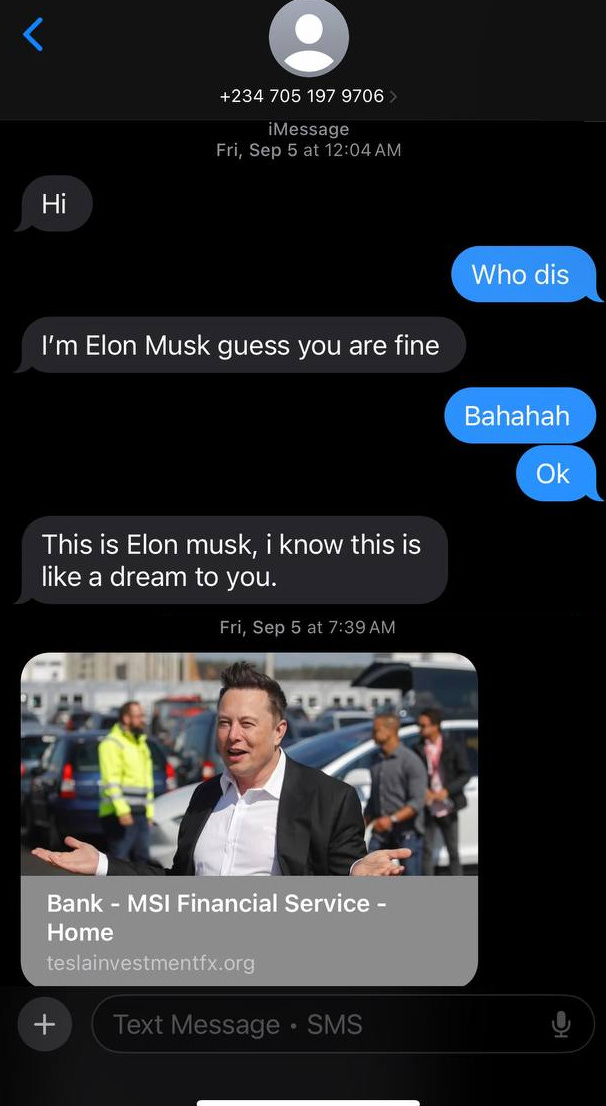
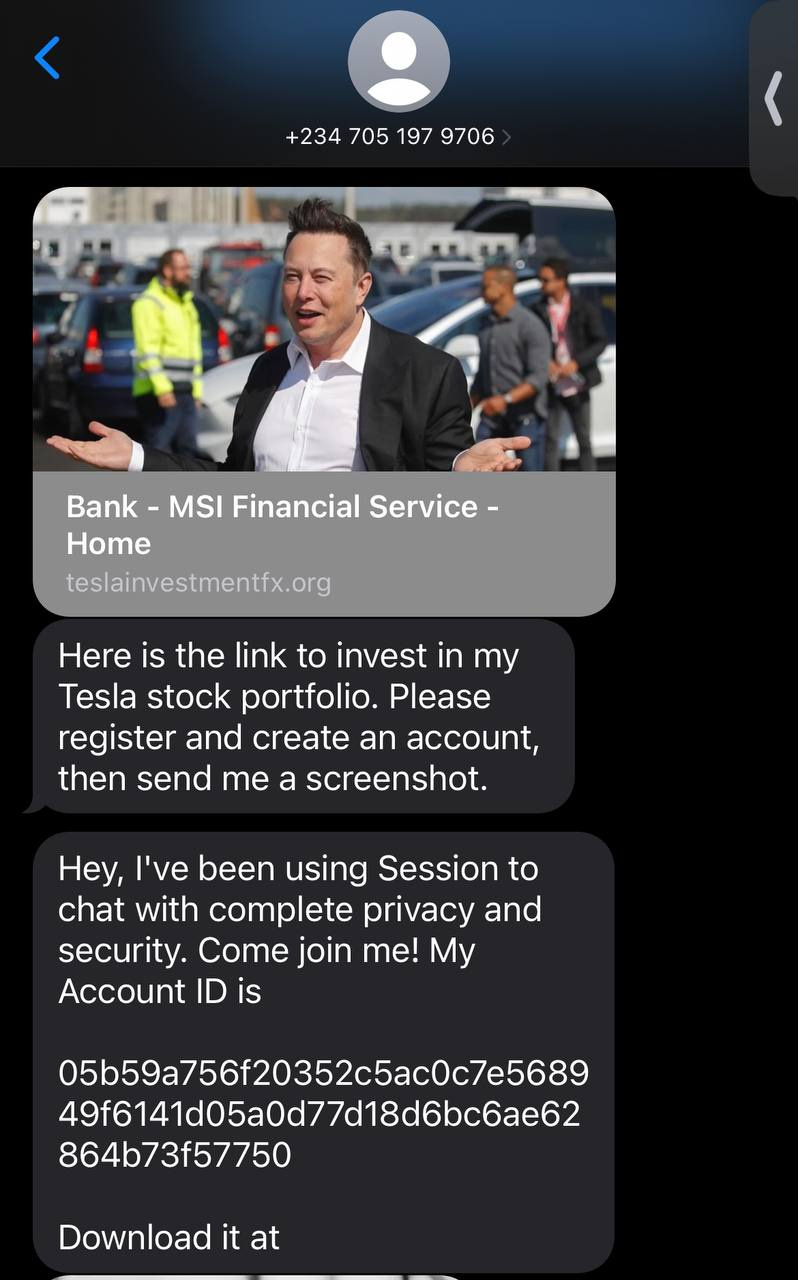
This wasn’t just fraud — it feels like targeted harassment, exploiting X’s vulnerabilities to silence a journalist.
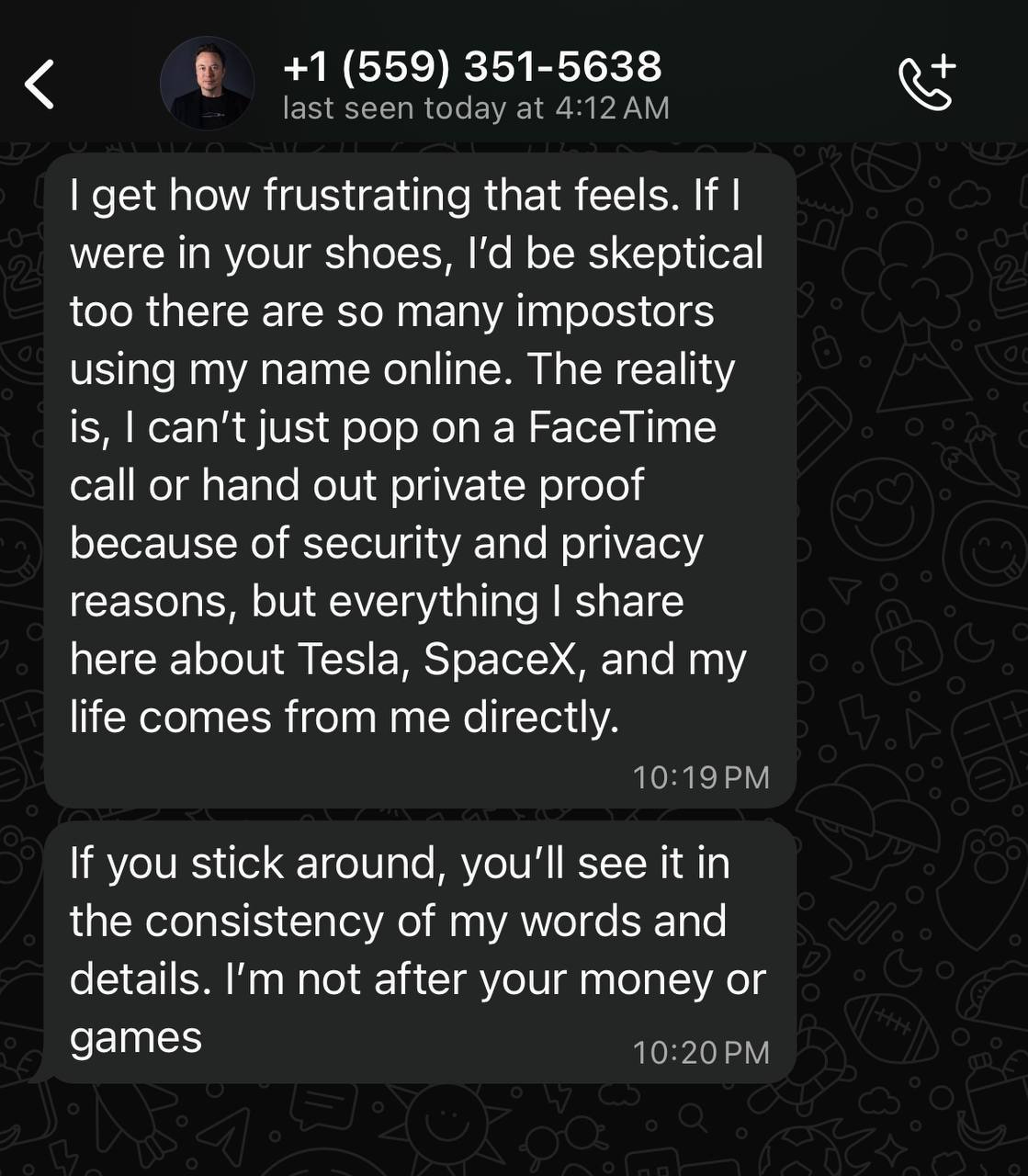
Victims’ Stories
CBS News reported Heidi Swan’s $10,000 loss to a deepfake crypto scam on Facebook and TikTok.
She described the videos as eerily convincing, even after learning they were fake.
Fox News detailed a Jensen Beach, Florida, woman’s $800 loss to a Musk impersonator on Facebook, promising a Tesla and $250,000 for gift card “delivery fees.”
She realized the scam when demands escalated for a “broken-down truck.”
Gizmodo’s Freedom of Information Act request to the Federal Trade Commission unveils a heart-wrenching mosaic of lives upended by scammers wielding Elon Musk’s likeness.
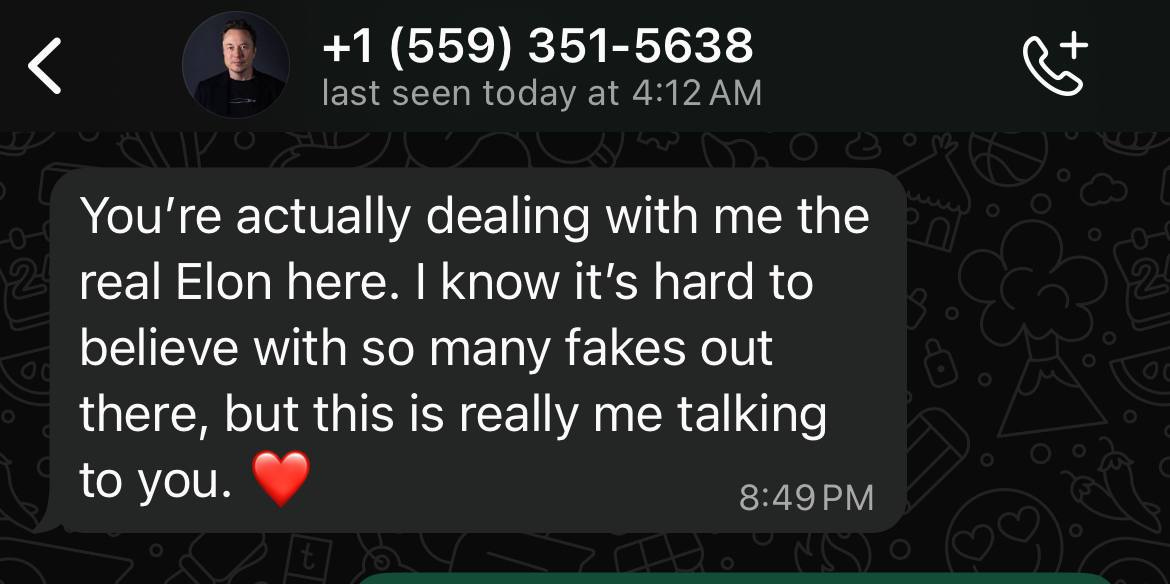
In Florida, a retiree in his late 60s, his savings amassed over decades, watched $225,000 vanish after a slick YouTube livestream promised Musk would double his cryptocurrency.
A younger Floridian, a 40-something dreamer, poured $120,000 into a sham investment group advertised on YouTube, lured by promises of wealth tied to Musk’s name.
An Arkansas man in his 40s, captivated by a SpaceX-branded website during a Starship launch, sent $90,000 in bitcoin, convinced it was legitimate.
In Georgia, a middle-aged professional lost $85,000 to an Instagram scam touting a Musk-endorsed crypto app, his trust betrayed by a polished facade.
The elderly bore the brunt of this digital deception.
An Arizona woman in her 70s, her heart swayed by a Telegram fraudster posing as Musk and his “manager,” lost $75,000 to a crypto-mining scheme.
In Washington, another septuagenarian, dreaming of love, surrendered $65,300 to a scammer she believed was Musk, her “boyfriend,” who promised a future together.
A Tennessean grandmother, also in her 70s, fell for a romance scam on Facebook, losing $8,000 to a fake Musk whispering sweet nothings via WhatsApp.
A South Carolina retiree, her trust eroded over three years on the obscure Zangi app, saw $8,000 vanish into a crypto wallet.
The scams struck all ages.
These stories, spanning ages and regions, reveal a cruel pattern: scammers exploiting Musk’s fame to prey on hope, trust, and vulnerability, leaving a trail of financial ruin and emotional devastation.
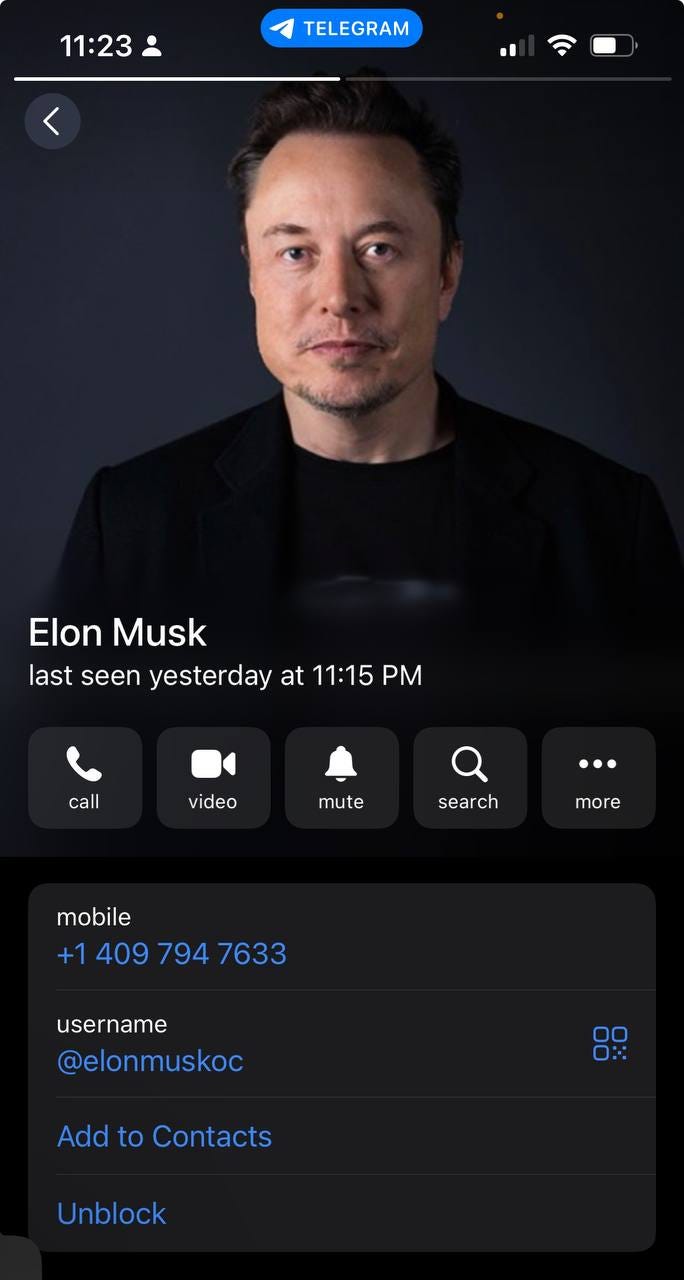
Elon Musk’s Silence
Musk, worth an estimated $500 billion per Forbes, remains conspicuously silent as these scams proliferate on X, his own platform.
No public statements or visible efforts to curb this fraud have emerged, raising questions about his commitment to user safety.
Protecting Yourself and Seeking Recourse
Consumers must exercise vigilance to avoid these scams.
Never send gift cards or cryptocurrency to unverified individuals.
Skepticism is crucial for celebrity investment offers; Musk isn’t messaging strangers.
Avoid moving conversations to private apps like WhatsApp, which lack oversight.
Data removal services like Incogni can reduce exposure on data broker sites.
Install antivirus software to block phishing links and use two-factor authentication with password managers for security.
Watch for red flags: unsolicited friend requests, urgent demands, or poor grammar.
Victims should report scams immediately on platforms like X or Facebook and file complaints at ReportFraud.ftc.gov.
Contact banks or crypto exchanges to attempt fund recovery, though success is rare.
Preserve evidence like screenshots and avoid further engagement with scammers.
*Analyst Note*
This isn’t just a scam — it’s a betrayal.
Musk, the self-styled free-speech warrior, lets fraudsters run wild on X, exploiting his name to ruin lives.
Victims face financial and emotional devastation, yet Musk offers no response.
My account’s hijacking wasn’t just a prank; it was a deliberate attack on my work, enabled by X’s lax oversight.
Platforms must deploy real-time AI detection and stricter verification, not half-hearted warnings.
Musk’s silence isn’t just negligence — it’s complicity in a digital Wild West where trust is the ultimate casualty.
A Scandal of Inaction
Tick, tick, tick… Scammers wielding Elon Musk’s face and voice plunder billions, leaving victims like Heidi Swan and countless others in ruins.
On X, fraudsters thrive, unchecked by the platform’s billionaire owner.
No arrests, no justice, just a growing tally of broken dreams.
The question burns: when will Musk act? Consumer Diligence signs off, but the clock keeps ticking.
Can You Help Us?
Have a tip? Send leads to leads@consumerdiligence.org
